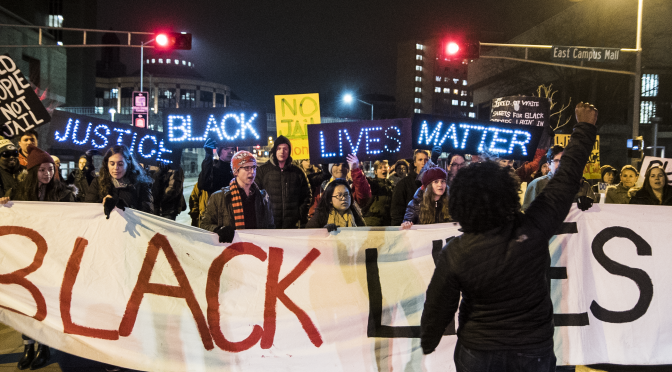With #BlackLivesMatter bringing the 1994 Crime Bill back into the fore, and a competitive race for the Democratic presidential nomination that has placed Bill and Hillary Clinton’s record back on trial in the court of public opinion, more people than ever are asking: what really happened in the 90s? How did we get here, into a world of harsh sentencing and mass incarceration? And how can understanding what happened in the past help us move forward?
The Murphy Institute’s Michael Javen Fortner, author of the widely-reviewed book Black Silent Majority: The Rockefeller Drug Laws and the Politics of Punishment, recently spoke with Salon.com’s Chauncey Devega to address some of these questions. Check out some of this fascinating interview below, and head to Salon to read it in full.
As I watched Bill Clinton’s exchange with the “Black Lives Matter” protesters in Philadelphia several weeks ago, I immediately thought of your book “The Black Silent Majority.” What was your response to Bill Clinton’s behavior at the Philadelphia rally?
I had two reactions. One was that Bill Clinton is obviously out of practice and he continues to be amazingly thin-skinned. In terms of a political performance he acted badly. I thought he was condescending and way too defensive. I also thought it was strange at first, because he also has in the past repudiated some of his anti-crime strategies. His wife also gave a speech on the era of mass incarceration saying that it needs to end. So Bill Clinton’s attitude and posture towards the protesters given all those factors seems strange and unwise.
My second reaction to Bill Clinton was that there was some truth to what he was saying. The part where he suggested that he had been hearing from African-American groups and individuals that the federal government needed to do something about crime in the streets and that their children were dying was largely correct.
In an earlier piece here at Salon on Bill Clinton and the 1994 Crime Bill, I framed my argument in terms of what I described as “the privileged perch of hindsight.” What do you think that those activists, scholars, politicians, and other actors who are now critical of Bill Clinton and the 1994 Crime Bill are omitting in their analyses?
Many people, scholars included, do not believe that African-Americans would respond to crime in their neighborhoods by advocating or supporting “tough on crime” policies. They are just wrong on that. It is an easy empirical question to answer. Go back in time and examine survey evidence. Did African-African Americans support “tough on crime” policies? The answer is “yes.” There is one Los Angeles Times poll which showed that nearly 70 percent of African-Americans supported “three strikes you’re out.” A little over 70 percent supported treating juveniles who committed crimes as adults. Those patterns were repeated in other surveys.
Ultimately, I believe that many people who are critical of Bill Clinton simply do not believe that black people would respond in this fundamentally normal way to crime. And because of that disbelief they direct all of their ire towards Bill and Hillary Clinton. There are many more people implemented in the development of “tough on crime” policies and they need to be scrutinized—including African-Americans.
How do we parse the support of black elites for the 1994 Crime Bill for example (or the earlier Rockefeller Crime Bill) and how the rank and file members of the African-American community felt about those policies?
This is another crucial point. Analytically and conceptually we need to distinguish between “regular folks” and political elites. It is possible that although black elected officials may claim to represent the black public, their constituents, and not share their preferences on every issue. Black elected officials may have their own ideas and be shaped by other pressures and influences.
What I found with the Rockefeller Drug laws and my review of the 1994 Crime Bill was that there were a good number of black elected officials who were farther to the left on these issues than the people they represent. They tend not to be as punitive as the people living in those communities who have to deal with crime on a day-to-day basis.
How do you think that disconnect is influencing the ways that “Black Lives Matter” and other groups are responding to the Clintons and the 1994 Crime Bill?
There is a narrative which has developed that is very alluring while also being very painful. In this story, mass incarceration, the modern carceral state, is simply something that just happened to black people. Moreover, that mass incarceration is simply an act of white supremacy on black folks. Of course, we should never forget or overlook how our criminal justice system is embedded within racial structures and impacted by negative racial attitudes on multiple levels. But, these are also very complicated political and bureaucratic dynamics at play. Because so many people have grasped onto how black people are the victims of these processes, as opposed to having any role in them, critics immediately criticize white politicians and other elites.
Of course, in some sense, they should. We should never stop fighting racism in the criminal justice system. But too narrow a focus makes the political and moral argument too simple. For example, if a black person is in jail only because a white supremacist drug policy was put in place the solution to his predicament is very simple. Let him out. But, what if a black person is in jail because they participated in illegal activities, violent crime especially? You now have a harder political and moral argument to make.
This is why many people shift to a very simple race focused argument because it allows for a very simple moral debate.



